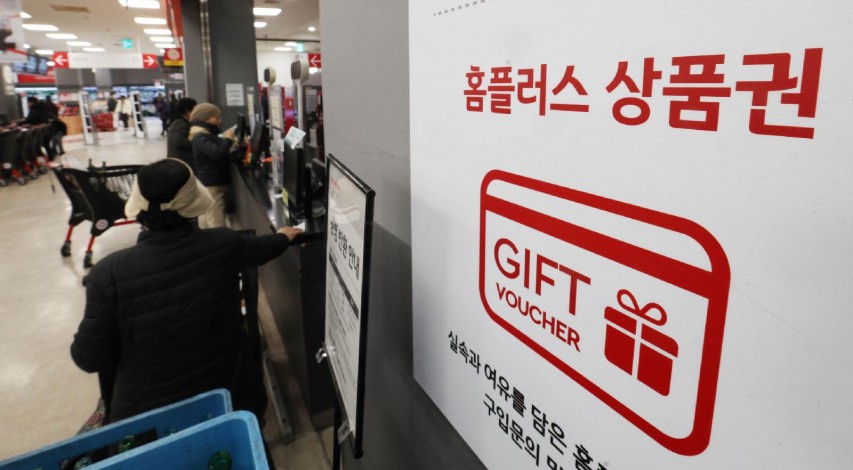[Feature] Declining Homeplus: What Should We Be Looking At?
Homeplus, the second-largest retail chain in Korea, has applied for rehabilitation procedures due to financial difficulties. This decision has eroded trust among both consumers and business partners. Given Homeplus's significant presence in local communities, even minor changes in its financial status could have far-reaching impacts.

Homeplus signboard
Photo: Maeil Business Newspaper (mk.co.kr)
Homeplus's Financial Crisis and Rehabilitation Filing
On March 4, Homeplus applied for corporate rehabilitation procedures through the Seoul Rehabilitation Court for preemptive restructuring. This action aims to normalize their negative financial status under legal protection. The court accepted their request within one day, requiring Homeplus to maintain regular debt payments to business partners for transactions and services, while temporarily suspending borrowing from financial institutions. Homeplus must submit a rehabilitation plan by June 3 this year and follow the approved plan to stabilize its status.
According to Homeplus's official webpage, "To prepare for financial and operational issues that may arise due to a credit rating downgrade" is the primary reason for the application. Over the past nine years, they have attempted to stabilize their finances by selling 21 stores to reduce operating expenses. However, after recording deficits for three consecutive years and an accumulated deficit exceeding 20 times the annual revenue, their efforts have proven ineffective.
In particular, Homeplus's reliability has declined recently. Data from Korea Investors Service shows Homeplus's credit rating was downgraded from A3 to A3- on February 27 of this year. The downgrade was attributed to shifting consumer preferences from large marts to e-commerce platforms, as well as changing consumption patterns from bulk purchases to smaller quantities—factors that have weakened the supermarket's competitive position. Given this situation, Homeplus's decision aims to prevent further negative consequences.
Loss of Trust from Consumers and Partners
The rehabilitation application has already brought disruptions to the business chain. Korean Mart Labor Union's Director of Organization Bae Jun-gyeong explained the current consequences, noting that companies like Lotte Chilsung, LG Uplus, Ottogi, and others have stopped supplying their products. For example, electronics sections in stores are experiencing product shortages and only have display models available. This suggests that product availability is likely to continue declining due to the rehabilitation filing.
Like their business partners, consumers have also lost trust in the company. According to Director Bae, customers initially tried to redeem their coupons for cash. After the rehabilitation application led to usage limitations, customers began buying products and immediately requesting refunds—effectively turning their coupons into cash through refunds. He noted that this has increased the workload for the customer service department, and if this trend continues, it will likely deplete the company's cash reserves.

Homeplus coupon service center
photo: Photo: Maeil Business Newspaper (mk.co.kr)
Homeplus Crisis: Future Scenarios
Professor Park Sang-in of Seoul National University's Graduate School of Public Administration outlined potential future scenarios. “The most ideal outcome is financial stabilization. If the company successfully stabilizes through rehabilitation, operations would return to normal with minimal impact on local communities and small business owners,” he explained.
However, Prof. Park explained that Homeplus is more likely to sell its buildings. Currently, of Homeplus's total 2 trillion won debt, 1.2 trillion won was borrowed from Meritz corporations at a 10% interest rate, with half of Homeplus's real estate assets used as collateral—valued at approximately 4.7 trillion won. To stabilize its financial status, Homeplus will ask Meritz to lower the interest rate. However, for Meritz, owning the real estate would be more valuable than continued lending, making this an unattractive option. Thus, if Meritz takes ownership of the real estate, the market buildings could be sold to recover the principal investment.
Prof. Park also explained another possible scenario. MBK, a private equity fund corporation that has owned Homeplus since 2015, could protect its investment value if it had recovered its investment within five years. However, they have failed to withdraw their investment for 10 years, increasing their opportunity cost. If Homeplus completes the interest rate adjustment with Meritz, which would decrease the financial risk, MBK is likely to exit the investment when the risk is lowered. In this process, the market buildings will be sold, or Homeplus will end several business areas—such as Homeplus Express and Homeplus Mall.
Director Bae emphasized that the disappearance of these buildings would significantly impact local communities. The supermarket's presence increases foot traffic in the area, which has led to the development of various surrounding businesses that depend on the market's offerings. If the supermarket closes, the resulting decrease in foot traffic would adversely affect these neighboring establishments.
Prof. Shin Hyeon-han of Yonsei University raised concerns beyond the local community impacts. He stressed that adjustments in the market chain will destabilize the employment market. Moreover, a cash flow disruption from a large supermarket could affect the broader economy.

Primary stakeholders of Homeplus regarding funding
photo: Invest Chosun (investchosun.com)
The Situation Remains Uncertain Until June
Despite various stories circulating among people, the final outcome will only be known in June when the rehabilitation plan is revealed. Director Bae emphasized that nothing can be guaranteed until the document is approved. All these rumors cannot be verified before the court makes any decisions.
Given this situation, Prof. Park added that monitoring is necessary. He agreed that nothing can be known before the court makes its decision, emphasizing the importance of how companies, consumers, and governments are intervening and discussing this issue. This will allow people to have a deeper understanding when future changes occur.
Prof. Shin also suggested measures worth consideration. He emphasized the importance of programs to help vulnerable populations, who would be most affected by these changes. Additionally, to address store closures, he proposed reducing supermarket dependency and finding alternative uses for empty buildings. Regarding financial matters, he suggested that support programs like short-term loans or tax deferrals should be considered to prevent immediate financial difficulties for business partners and small businesses surrounding Homeplus.
Homeplus, South Korea's second-largest supermarket chain, has begun to receive court protection due to mounting financial difficulties. While the company has vowed to maintain normal operations, trust from both consumers and business partners has already eroded. Given Homeplus's integral role in many local communities, it is crucial to monitor how the situation unfolds in the coming months.
There are no registered comments.
- 1
- 2
I agree to the collection of personal information. [view]



